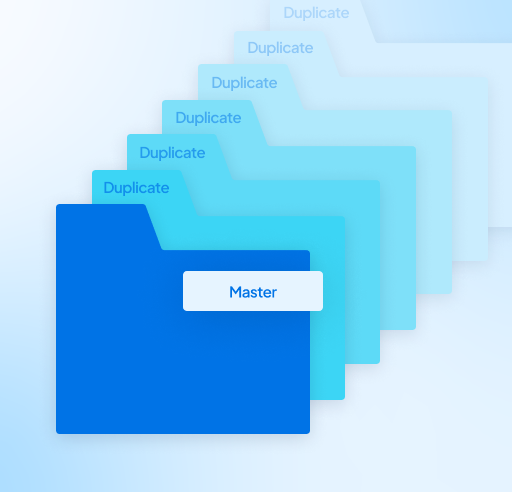

Assure your customers their data is safe with you
Protect your customers and your business with
the Data Trust Platform.
Learn about the hidden risks of duplicate records in organizations, including security risks and increased storage costs, and how to overcome them.

During normal business operations, end-users inevitably duplicate files they are working on to complete their tasks more quickly or efficiently, or to work around restrictive IT policies. Who hasn’t emailed a copy of a file to a colleague to review? But while such duplication may feel harmless, even unavoidable, duplicate files can significantly impact your risk posture.
The Healthcare sector offers a vivid example of the risks of duplicate records. According to the American Health Information Management Association, the average hospital has a 10% duplication rate of patient records. These duplicate records can lead to errors in medical treatment, including incorrect diagnoses, medications, and procedures. But duplicate records create issues for all industries.
Duplicate records can pose a significant security risk, particularly if they contain sensitive personal information. Cybercriminals may target duplicate records to gain access to valuable data or to launch phishing attacks, which can put the organization and its customers at risk.
Suppose multiple versions of the same record are stored in different locations or systems. In that case, it can be difficult to track who has access to the data, how it is being used, and whether it is being adequately protected. Such understanding is essential to improve your security posture.
Duplicate records create administrative burdens for information managers and can result in delays in information processing and discovery. Duplicates hinder Freedom of Information (FOI) and Data Subject Access Requests (DSAR) processes as they create confusion and inconsistencies.
In the case of a FOI request for a specific document, if the document is stored in multiple locations with different versions, it can be challenging to locate the correct version and provide an accurate and complete response to the request.
Learn more about the challenges of data discovery, and how to solve them.
Modern-day communications and instant messaging platforms such as Slack, Microsoft Teams and WhatsApp are often used to share copies of documents and other transitory records. If these systems are not being managed, how can you even identify these duplicate records, let alone associate an appropriate retention schedule?
Duplicate data can take up valuable storage space, requiring more storage resources and increasing costs. The true cost of storage goes beyond just a simple cost per TB equation, and includes indirect costs such as replication costs, transfer or cloud egress costs, and management costs. Learn more about calculating these costs and why data minimization matters here.
The first step towards strong data governance is creating a comprehensive data inventory of all your data. It is only possible to manage and govern data effectively if an organization knows what data it has, including duplicates.
Organizations need to have the processes and tooling in place to identify and manage duplicate records continuously. By doing so, organizations can ensure their information management processes' accuracy, security, and efficiency and reduce the risks associated with duplicate records.
View our expanded range of available Connectors, including popular SaaS platforms, such as Salesforce, Workday, Zendesk, SAP, and many more.
Get scalable identification of PII, PCI, duplicate records, and ROT across all your data


Protect your customers and your business with
the Data Trust Platform.